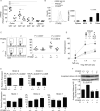The microbial metabolites, short-chain fatty acids, regulate colonic Treg cell homeostasis
- PMID: 23828891
- PMCID: PMC3807819
- DOI: 10.1126/science.1241165
The microbial metabolites, short-chain fatty acids, regulate colonic Treg cell homeostasis
Abstract
Regulatory T cells (Tregs) that express the transcription factor Foxp3 are critical for regulating intestinal inflammation. Candidate microbe approaches have identified bacterial species and strain-specific molecules that can affect intestinal immune responses, including species that modulate Treg responses. Because neither all humans nor mice harbor the same bacterial strains, we posited that more prevalent factors exist that regulate the number and function of colonic Tregs. We determined that short-chain fatty acids, gut microbiota-derived bacterial fermentation products, regulate the size and function of the colonic Treg pool and protect against colitis in a Ffar2-dependent manner in mice. Our study reveals that a class of abundant microbial metabolites underlies adaptive immune microbiota coadaptation and promotes colonic homeostasis and health.
Figures




Comment in
-
Immunology. Feed your Tregs more fiber.Science. 2013 Aug 2;341(6145):463-4. doi: 10.1126/science.1242674. Science. 2013. PMID: 23908210 No abstract available.
-
Metabolites from intestinal microbes shape Treg.Cell Res. 2013 Dec;23(12):1339-40. doi: 10.1038/cr.2013.125. Epub 2013 Sep 10. Cell Res. 2013. PMID: 24018374 Free PMC article.
-
Regulatory T cells: distilling regulatory T cell inducers.Nat Rev Immunol. 2013 Aug;13(8):546. doi: 10.1038/nri3506. Nat Rev Immunol. 2013. PMID: 24046840 No abstract available.
References
Publication types
MeSH terms
Substances
Grants and funding
LinkOut - more resources
Full Text Sources
Other Literature Sources
Medical
Molecular Biology Databases

